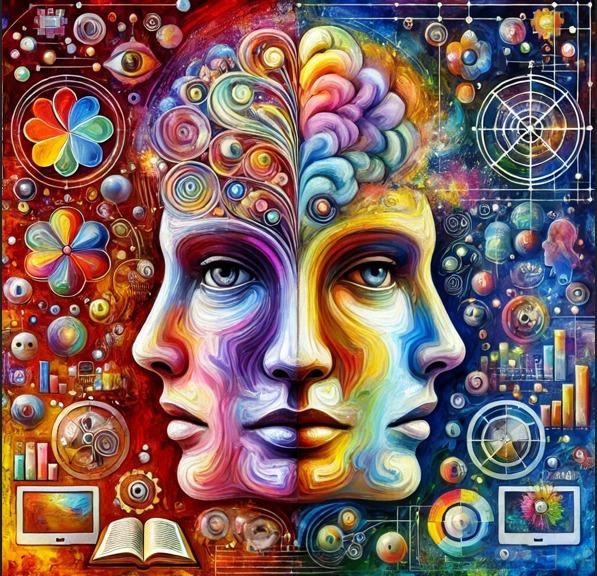In an age dominated by digital distractions and fleeting social media interactions, the timeless habit of reading offers a profound refuge. Not only does reading provide an escape into different worlds and ideas, but it also exercises both the right and left hemispheres of the brain. Engaging with books can enhance creativity, improve logical reasoning, and offer a myriad of cognitive and emotional benefits. This article explores seven key advantages of reading, supported by various scenarios illustrating how both creative and logical brain functions are stimulated through this enriching activity.
Right Brain Perspective vs. Left Brain Perspective
The right hemisphere of the brain is often associated with creativity, imagination, and holistic thinking. It is the side that allows individuals to appreciate art, understand emotions, and engage in activities that require innovative and abstract thinking. On the other hand, the left hemisphere is linked to logical reasoning, analytical thinking, and detailed processing. It is responsible for language skills, mathematical computations, and systematic problem-solving. Reading, as an activity, has the unique ability to engage both sides of the brain, providing a comprehensive mental workout that enhances both creative and logical abilities.
Below given are the 7 Benefits of Reading to Keep Both the Right and Left Side of Your Brain Constructively Occupied
- Enhanced Vocabulary and Communication Skills: Reading regularly introduces new words in context, making it easier to learn and incorporate them into daily conversations. This exposure helps articulate thoughts more clearly and effectively, which is beneficial in both personal and professional settings.
- Right Brain Perspective Scenario: Divakar, a graphic designer, found that reading fantasy novels enriched his descriptive vocabulary. This enhanced his ability to create vivid, imaginative designs and communicate his ideas more effectively to clients.
- Left Brain Perspective Scenario: Ruchir, a young lawyer, improved his legal writing and argumentation skills by reading classic literature and legal journals. The complex sentence structures and rich vocabulary helped him articulate his points with greater precision and clarity in court.
- Improved Concentration and Focus: Cultivating a reading habit trains the mind to focus and enhances concentration. Engaging with a book requires active attention, which can help improve overall focus and productivity in various aspects of life.
- Right Brain Perspective Scenario: Shikha, an artist, noticed that her ability to focus on intricate details in her paintings improved after she began reading biographies of famous artists. The narratives helped her concentrate for longer periods on her creative work.
- Left Brain Perspective Scenario: Kunal, an accountant, found that reading technical manuals and non-fiction books enhanced his ability to focus on complex calculations and financial analyses, increasing his productivity and accuracy at work.
- Increased Creativity and Imagination: Reading stimulates the brain’s right side, fostering creativity and imagination. It allows individuals to visualize scenarios, empathize with characters, and explore new ideas, enhancing problem-solving skills and innovative thinking.
- Right Brain Perspective Scenario: Vishal, a filmmaker, drew inspiration for his movies from science fiction and fantasy books. The imaginative worlds and unique characters sparked new ideas and storytelling techniques for his films.
- Left Brain Perspective Scenario: Sarah, a software developer, used her improved imagination from reading detective novels to think outside the box when debugging code. This creative problem-solving approach led to more efficient and innovative solutions.
- Cognitive Health and Longevity: Lifelong reading and continuous learning are linked to a reduced risk of cognitive decline, including conditions like Alzheimer’s disease. Regular mental engagement through reading keeps the brain sharp and can contribute to a longer, healthier life.
- Right Brain Perspective Scenario: Margaret, a retired teacher, maintained her cognitive sharpness by reading poetry and participating in book clubs. The metaphorical language and discussions kept her mentally agile and socially engaged.
- Left Brain Perspective Scenario: Shiv Kumar, a retired engineer, read scientific journals and technical books to keep his mind active. This continuous learning helped delay cognitive decline and kept his problem-solving skills sharp.
- Stress Reduction and Mental Well-being: Reading has therapeutic effects, helping to alleviate stress and promote relaxation. Studies show that reading for at least 30 minutes daily can reduce stress levels significantly, similar to the effects of laughter.
- Right Brain Perspective Scenario: Latika, a high-stress executive, found solace in reading romance novels before bed. The emotional and imaginative engagement provided a relaxing escape, reducing her overall stress levels.
- Left Brain Perspective Scenario: Karunesh, a financial analyst, turned to reading historical fiction to unwind. The structured plots and historical contexts helped him mentally detach from work-related stress, promoting better sleep and mental health.
- Social Empathy and Connection: Reading, especially fiction, enhances social empathy by allowing readers to understand different perspectives and emotions. This can lead to better interpersonal relationships and a deeper connection with others, making individuals more interesting and engaging in social settings.
- Right Brain Perspective Scenario: Aiza, a social worker, read contemporary fiction to better understand her clients’ diverse experiences. This enhanced her empathy and ability to connect with people from different backgrounds.
- Left Brain Perspective Scenario: Tushar, a business consultant, improved his interpersonal skills by reading non-fiction books on psychology and human behavior. This knowledge helped him build stronger relationships with clients and colleagues.
- Knowledge Acquisition and Intellectual Growth: Books are a rich source of knowledge on various subjects. Regular reading expands one’s understanding of the world, boosts intellectual growth, and provides a wealth of information that can be applied in everyday life and professional scenarios.
- Right Brain Perspective Scenario: Priti, a chef, expanded her culinary repertoire by reading cookbooks from various cultures. The creative recipes and techniques inspired her to innovate and introduce new dishes at her restaurant.
- Left Brain Perspective Scenario: Ethan, a research scientist, stayed updated with the latest advancements in his field by reading scientific papers and journals. This continuous knowledge acquisition fueled his intellectual growth and professional success.
Reading is more than just a pastime; it is a powerful tool that nurtures both the creative and logical aspects of the brain. Whether through enhancing vocabulary, improving focus, fostering creativity, promoting cognitive health, reducing stress, building empathy, or acquiring knowledge, the benefits of reading are vast and varied.
By dedicating time each day to reading, individuals can cultivate a well-rounded, intellectually stimulating, and emotionally fulfilling life. In an era where digital distractions are rampant, the timeless habit of reading stands as a beacon of holistic mental enrichment.
Author may be reached at : impactleadership@lifoholicshalini.com
Follow her on: https://www.linkedin.com/in/drshaliniverma/




 Each title in our collection is more than just a book - it’s a ‘green gift’, promoting mindful reading, sustainable values, and a culture of eco-conscious living. By gifting books, you open doors to new ideas, support lifelong learning, and nurture a more informed, compassionate, and environmentally aware individual.
Each title in our collection is more than just a book - it’s a ‘green gift’, promoting mindful reading, sustainable values, and a culture of eco-conscious living. By gifting books, you open doors to new ideas, support lifelong learning, and nurture a more informed, compassionate, and environmentally aware individual.